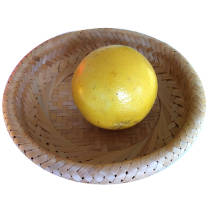Does Eating Grapefruit Cause Breast Cancer? A Look at Two Studies

A few years ago a possible connection between grapefruit consumption and breast cancer risk received a lot of media attention. But what's the truth about the topic: can eating grapefruit or drinking grapefruit juice really cause breast cancer in women? Are there enough reliable studies that support a link between grapefruit and breast cancer? In this article, we review the current evidence and explain the theory behind the ability of grapefruit to cause breast cancer.
Study 1: Regular Grapefruit Consumption Can Increase Breast Cancer Risk by Almost a Third
Cytochrome P450 3A4, better known as CYP3A4, is an enzyme that is involved in the metabolism of estrogens. Grapefruit and grapefruit juice, on the other hand, are known inhibitors of CYP3A4 and have been shown to increase plasma estrogen concentrations. High estrogen levels, in turn, have been linked to an increased breast cancer risk in postmenopausal women1. Intrigued by these facts, a group of researchers from the University of Southern California and the University of Hawaii decided to undertake a multi-ethnic cohort study to investigate the possibility of a link between grapefruit consumption and the risk of breast cancer. This study found that eating just a quarter of a grapefruit daily raised the risk of breast cancer by up to 30% in post-menopausal women. The 'grapefruit breast cancer link' was observed in women who were users of estrogen therapy or estrogen+progestin therapy, but also in women who had never used hormone therapy. This study involved 50,000 post-menopausal women from five racial/ethnic groups and was published in the prestigious British Journal of Cancer in 2007.2
The flavonoids naringin and naringenin and the furanocoumarin bergapten have been detected in grapefruit and grapefruit juice, while most other citrus fruits appear to contain no or very little naringin, naringenin, and bergapten3. Out of these, naringin is the most abundant compound in grapefruit juice products, followed by naringenin and bergapten4. Although bergapten is the least abundant, it appears to have the strongest inhibitory effect on CYP3A4. A study published in the Journal of Pharmaceutical Sciences in 2001 reported that the inhibition of CYP3A4 activity by bergapten was the strongest (67%), followed by naringenin (39%) and naringin (6%), at the same inhibitor concentration5.
Study 2: No Link Between Breast Cancer and Grapefruit Consumption
Shortly after the publication of the first 'breast cancer grapefruit link' study described above, Dr Kim and his colleagues from the Harvard School of Public Health published an interesting letter in the British Journal of Cancer. In their letter, Dr Kim and his fellow researchers reported the findings of their study which found no positive association with either grapefruit or grapefruit juice consumption and breast cancer risk among pre-menopausal and post-menopausal women. In fact, the researchers found evidence that grapefruit consumption could reduce the risk of certain types of breast cancer (oestrogen and progesterone receptor negative cancers).6 The data in this study were derived from the Nurses' Health Study which is one of the largest and longest running follow-up studies designed to investigate factors affecting women's health.
The Bottom Line
The jury is still out as to whether grapefruit and grapefruit juice can cause breast cancer. Until more studies are conducted and this controversy is resolved, limiting or avoiding grapefruit and grapefruit juice may be advisable if you have breast cancer or are at higher than usual risk for developing breast cancer.
References
- Key T, Appleby P, Barnes I, Reeves G (2002). Endogenous sex hormones and breast cancer in postmenopausal women: reanalysis of nine prospective studies. Journal of the National Cancer Institute, 94, 606-616
- Monroe KR, Murphy SP, Kolonel LN, Pike MC (2007). Prospective study of grapefruit intake and risk of breast cancer in postmenopausal women: the Multiethnic Cohort Study. British Journal of Cancer, 97, 440-445
- Ho PC, Saville DJ, Coville PF, Wanwimolruk S (2000). Content of CYP3A4 inhibitors, naringin, naringenin and bergapten in grapefruit and grapefruit juice products. Pharmaceutica Acta Helvetiae, 74(4), 379-385
- Wanwimolruk S, Marquez PV (2006). Variations in content of active ingredients causing drug interactions in grapefruit juice products sold in California. Drug Metabolism and Drug Interactions, 21(3-4), 233-43
- Ho PC, Saville DJ, Wanwimolruk S (2001). Inhibition of human CYP3A4 activity by grapefruit flavonoids, furanocoumarins and related compounds. Journal of Pharmaceutical Sciences, 4(3), 217-27
- Kim EH, Hankinson SE, Eliassen AH, Willett WC (2008). A prospective study of grapefruit and grapefruit juice intake and breast cancer risk. British Journal of Cancer, 98, 240-241
Don't Miss This
 Best Frozen Dessert Maker: Yonanas vs Swirlio vs Dessert Bullet
Frozen dessert makers are all the rage, but which model is the best?
Best Frozen Dessert Maker: Yonanas vs Swirlio vs Dessert Bullet
Frozen dessert makers are all the rage, but which model is the best?

